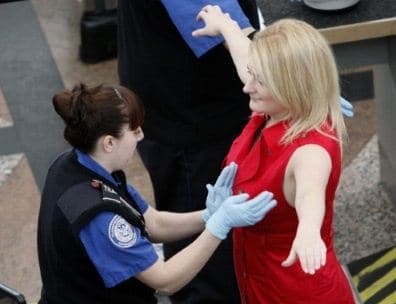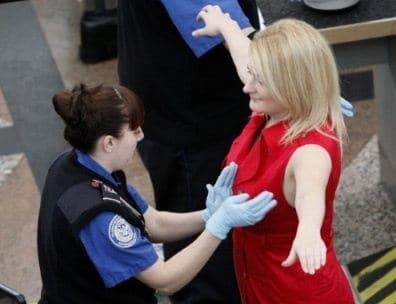As a result of a study, which found that weapons routinely make it past airport security, the TSA is introducing “more rigorous” and “comprehensive” physical inspections at airports around the country, according to Bloomberg. The security agency, which until now had the option of using five different types of physical pat-downs in the screening line, is eliminating the “options” and replacing them with a single, universal method which would involve heavier groping.
The Transportation Security Administration made the announcement to its agents this week, and in the case of Denver International Airport employees, advised employees and flight crews on Thursday that the “more rigorous” searches “will be more thorough and may involve an officer making more intimate contact than before.”
In an ominous warning, TSA spokesman Bruce Anderson told Bloomberg that “people who in the past would have gotten a pat-down that wasn’t involved will notice that the [new] pat-down is more involved.” The shift from the previous, risk-based assessment on which pat-down procedure an officer should apply was phased in over the past two weeks after tests at smaller airports. In their notice, Denver airport officials said employees are subject to search at random locations: “If a pat down is required as part of the operation, badged employees will be required to comply with a TSA officer’s request to conduct a full body pat down.”
The new policy will also apply to pilots and flight attendants, classified as “known crewmembers” who generally receive less scrutiny at checkpoints. The TSA conducts occasional random searches of these employees, and airlines this week inquired as to whether their employees would be subject to more frequent pat-downs. The number of random searches for airline crews isn’t changing and will remain a “very small percentage” of the total, Anderson said. But airport employees may face more random checks.
Anyone who declines use of the TSA’s existing conventional scanner screen will be subject to the new pat-down. The TSA currently screens about 2 million people daily at U.S. airports. The agency doesn’t track how many passengers are subject to pat-down searches after they pass through an imaging scanner.
The TSA has been criticized in recent years for its overall screening techniques after an internal investigation by Homeland Security in 2015 found that the TSA failed an unbelievable 95 percent of airport security tests, allowing undercover agents to successfully and repeatedlysmuggle mock explosives and banned weapons through checkpoints in the country’s busiest airports. As a result, the TSA has been in desperate need of change and the physical inspection would be a good place to start.
That said, the agency has been ridiculed for years for causing delays at airports and being largely ineffective at detecting contraband. The good news is that while passengers may find the new patdown more intrusive, Anderson promised that the new screening procedure isn’t expected to increase overall airport security delays. However, “for the person who gets the pat down, it will slow them down.”
As Bloomberg adds, in December, a CNN political commentator, Angela Rye, posted an article online describing her “humiliation” during a TSA agent’s search. Rye wrote in graphic detail about the pat down of her genitals during a search at the Detroit Airport before a flight to New York.
TSA officials didn’t immediately address whether the new universal pat-down protocol will mandate touching of passenger genitals.
While the physical screening process has been a stress point for the TSA practically since its inception, the agency has tried to make travelers more comfortable by pairing them up with people of the same gender for pat-downs and also giving people the option of being inspected in a private room, however at the cost of substantial travel delays. However, as some have mused out, it still doesn’t answer one of the most confounding questions about the TSA: “Is America really any safer because some underpaid worker grabbed a pussy at the airport?”
Reprinted with permission from ZeroHedge.


